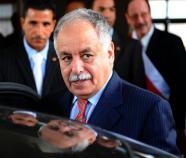Heavy fighting continued in Kufra on Tuesday between members of the Tebu ethnic group and the Zway tribe despite a report . . .[restrict]from Libyan security sources on Monday night that the fighting had ended. So far it is reported that at least 17 people have been killed.
The electricity supply in the town has been cut and a Tebu man in Kufra, Sulaiman Isa, said that the leader of the Tebu in the area, Isa Abdul Majid, had fled towards the border with Chad, leaving Tebu fighters and civilians “besieged” in the town by Zway fighters.
These are supported by brigadesmen from Bengahzi, Agdabya, Derna and elsewhere in Libya, flown into Kufra by the Ministry of Defence on Monday. It was reported in Tripoli on Tuesday that brigadesmen from the capital were also being flown to the southeastern town to put down what is being seen as more than an inter-tribal conflict.
There is a long history of rivalry in Kufra and the wider region between the Tebu and the Zway, who account for over 70 percent of the town’s 60,000 population. Tebu numbers are put at no more than 3,000. Part of the rivalry is said to be due to competing smuggling interests.
Both sides now accuse each other of starting the fighting as well as cutting the electricity supply. A Tebu spokesman, Hussein Al-Lashi, said that the supply had been cut to the area where Tebu people live, but others say the whole town is without power following a rocket attack on the electricity station by Tebu fighters.
Al-Lashi meanwhile accused the Zway on Tuesday of planning “genocide” and even alledged the NTC were complicit in it. “We need the world to see what is happening” he said, calling for UN protection.
The Tebu are nonetheless reportedly well-armed, which may explain why, despite their much smaller numbers, the fighting has continued.
One of the accusations made against Isa Abdul Majid by both the Zway and NTC sources is that he grew rich as a result of smuggling across the Libya-Chad border and then tried to set himself up as a major power player, using his wealth to acquire an arsenal of weapons and hiring and importing Tebu fighters from Chad. “He wants a Tabu state in the south,” said one Libyan security official, claiming that Isa had had links with Qaddafi before breaking with him and then joining the revolution against him.
The question of who is and who is not a Libyan Tebu is complicated by the fact that in 2007 Qaddafi stripped large numbers of Tebu of Libyan citizenship. Many have remained in southern Libya, others went to Chad. Those in Libya still regard themselves as Libyans. Many Libyans, however, regards them as Chadian. The Tebu are found in northern Chad, eastern Niger and parts of southern Algeria.
Security in the country’s south, with its porous borders with Chad and Niger has long been a sensitive issue for Libya. There have been a series of sporadic wars involving Chad and Libya over the years and in the early 1970s Chad claimed Fezzan while the Qaddafi regime occupied the Aouzou strip from 1976 to 1994.
Last week’s claim by Saadi Qaddafi in a TV interview from his exile in Niger that he had support in Libya for a counter-revolution and that his return to Libya was imminent has also complicated the situation in regards to Kufra.
Saadi’s claims, coming just days before the first anniversary of the 17 February revolution, have resulted in an intensified security presence across the country. However, they appear to have significantly backfired in that they have forged a renewed sense of unity among all the various groups and factions throughout the country, rallying support for the NTC at a time it was facing growing criticism.
In Tripoli in the past couple of days, brigadesmen from Zintan and Misrata, previously said to be increasingly distrustful of each other, have been making a show of driving round the streets together to demonstrate their solidarity.
However, the timing of Saadi’s claims, the Kufra clashes and the 17 February anniversary have given rise to suspicions among some Libyans of a link between Saadi and Isa Abdul Majid. The claims are unsubstantiated but they appear to be believed in some quarters.
Ironically, a national Tebu conference in Tripoli was planned for March. It is unknown whether it will now go ahead.
Saadi’s claims have meanwhile led to Libya renewing its demand that Niger extradite him. Niger has again refused but is clearly embarrassed by his behaviour which goes against the rules of asylum. It has said that it would extradite him to The Hague if requested by the International Criminal Court.
In December, Saadi’s sister Aisha caused similar embarrassment for her hosts in Algeria when she also publicly called for a counter-revolution in Libya. It was the second time she had done so, prompting a warning from Algiers that any further “unacceptable” transgressions by her would have consequences.
On Monday, the Libyan Interior Minister Fawzi Abdelal further repeated demands to both Niger and Algeria that they hand over Qaddafi family members. In what was also seen as an oblique reference to the events in Kufra, he added that the government was determined to respond to any attempt to destabilise Libya’s security during the celebrations for the first anniversary of the Revolution of 17 February. “I will not allow any person to prejudice the security of the country, or to spoil the Libyans joy at the first festival of the victory of their revolution,” he said. [/restrict]








